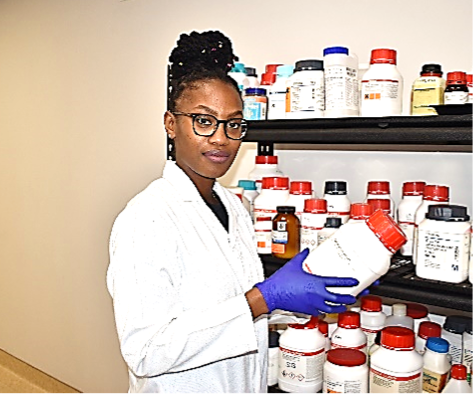DRUG DISCOVERY AND METABOLOMICS
 Dr. Gabriel Mashabela
Dr. Gabriel Mashabela
Head of GabLab
gabrielm@sun.ac.za

Dr. Gabriel Mashabela is a specialist scientist at the South African Medical Research council centre for TB research unit, based in the division of molecular biology and human genetics at the University of Stellenbosch. After obtaining his Ph.D. at the University of Cape Town in the division of chemical pathology, he joined the University of Basel, Switzerland for his postdoctoral fellowship working on a project aimed at elucidating the biosynthetic pathways of low molecular weight thiols produced by pathogenic mycobacteria and trypanosomes. This was later followed by another postdoctoral fellowship in the lab of Professor Valerie Mizrahi at the University of Cape Town where he studied the metabolism of vitamin B12 in mycobacteria. As part of a global effort to combat TB and shorten the TB drug treatment, Dr Mashabela's research interests focus on the selection, validation, and drug targeting of key mycobacterial metabolic pathways that play critical roles in TB pathogenesis, persistance and virulence.
 Mr. Tumelo Maila
Mr. Tumelo Maila
Doctoral candidate
tumelomaila@sun.ac.za



Research theme: TB treatment shortening. My project investigates gene-gene and chemical-genetic interactions to identify combinations that promote rapid bacterial killing upon genetic knockdown or chemical inhibition. CRISPRi multiplexing is applied for gene-gene interaction study, while chemical genetic interaction work is conducted using selected first- and second-line antibiotics to treat CRISPRi hypomorphs in order to establish potential hypersensitization. The results will be crucial towards development of new effective drug combinations to shorten TB treatment time.
 Ms. Nenekazi Masikantsi
Ms. Nenekazi Masikantsi
Doctoral candidate
mnene@sun.ac.za


Research theme: CRISPRi Screening models. Generation and qualification of CRISPRi strains for target mechanism-based whole-cell screening. Essential genes, which code for enzymes that mediate steps in Mycobacteria-specific essential metabolic pathways are carefully selected and targeted utilizing CRISPR interference system. CRISPRi knockdown strains are generated, evaluated, and prioritized for use as screening models for isolation of bioactive agents found in crude natural products and elucidation of the mode of action of pure bioactive compounds.
Ms. Patience Malada
Doctoral Candidate
Research theme: Mycobacterial survival mechanisms. Study the role of the MEP pathway on Mycobacterial tuberculosis survival in macrophages and potentiation of antimycobacterial activities of some medicinal plants in MEP pathway deficient mutants. MEP pathway is one of the most essential metabolic pathways required for Mycobacterial survival, with enzymes of this pathway ranked at the top of the most attractive drug targets by recent multiple studies. However, finding inhibitors of these pathways by conventional means has been rather disappointing. We aim to identify bioactive compounds whose antimicrobial activities are highly potentiated by deficiencies in the MEP pathway, as these compounds may turn out to be inhibitors of MEP pathway enzymes.
 Ms. Gugulethu Mahlakwana
Ms. Gugulethu Mahlakwana
Masters candidate
gugulethu@sun.ac.za


Research theme: Target prioritization - comparison of the vulnerability of two essential decaprenyl phosphate transferases, WecA and MurX. Target prioritization means wasting less time and resources on less vulnerable (druggable) targets and pushing forward the more vulnerable targets. Using CRISPRi tool, we generate knockdown models or hypomorphs that we use to investigate or rather compare the vulnerability of cell wall biosynthetic enzymes WecA and MurX, to subsequently determine the better drug target. We believe that disruption of the cell wall, which forms a robust protective barrier against small molecules (antibiotics) and other environmental stresses, would make the bacteria more susceptible to drugs. We use this tool as it does not require extraction or cleavage of genes or proteins to be able to modulate their expression
 Mr. Nuhu Tukur
Mr. Nuhu Tukur
Masters candidate
nuhutukur@sun.ac.za

Research theme: Mycobacterial survival mechanisms. Examine the role of MEP pathway on Mycobacterium smegmatis survival in macrophages: Transcriptional knockdown of two Mycobacterial MEP pathway [Fe-S] cluster dependent enzymes recently found to be associated with a strong loss of fitness, and hypomorphs of these enzymes were highly hypersensitive to reactive nitrogen species in vitro. My project aims to study the survival dynamics of the same hypomorphs ex vivo using activated macrophages.
 Mr. Sinalo Mdolo
Mr. Sinalo Mdolo
Masters candidate
smdolo@sun.ac.za



Research theme: Mycobacterial survival mechanisms. Study the impact of MEP pathway on tRNA modification and the effect on drug antioxidant tolerance. Drug tolerance in Mycobacterium tuberculosis, a situation in which the pathogen survives lethal concentration of antibiotics, is a well-known phenomenon that precedes drug resistance. However, molecular mechanisms encompassing drug tolerance remain elusive. My project aims to utilize a combination of targeted metabolomics and hypomorph to investigate the potential role played by translational infidelity on drug tolerance. The results of this study will assist in efforts to fight emerging drug resistance.
 Mr. Mpatla Blessing Mangale
Mr. Mpatla Blessing Mangale
Masters candidate
mbmangale@sun.ac.za


Research theme: Vulnerable targets. Elucidation of the molecular mechanism behind ∆cyoE hypomorph associated fitness cost. Using mass spectrometry, my project investigates cytoplasmic and periplasmic changes of heme B and heme O levels, respectively, in ∆cyoE hypomorphs under different oxidative stresses. Results of the study will provide insights into alternative mechanisms utilized by Mycobacterium tuberculosis to avoid heme and iron toxicity.

